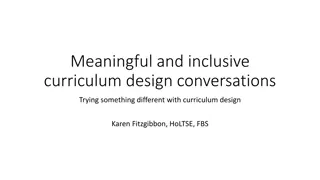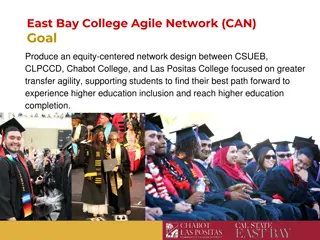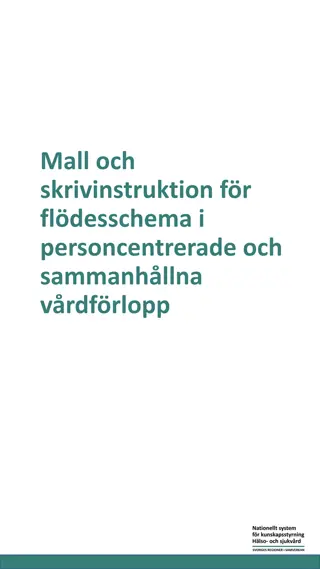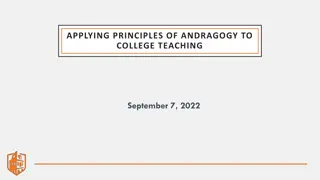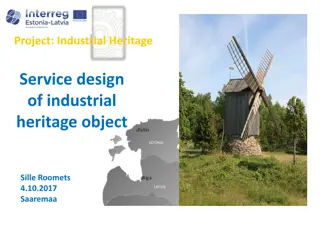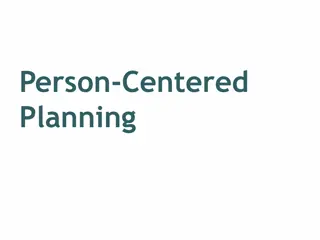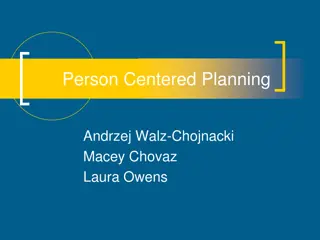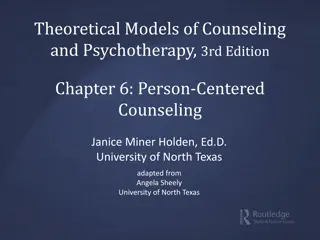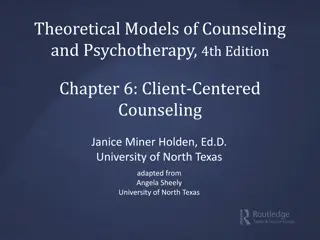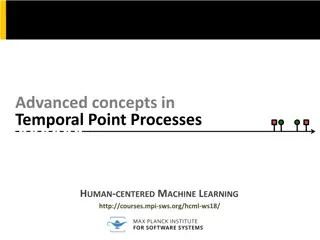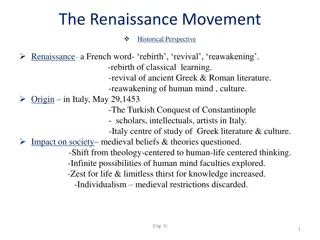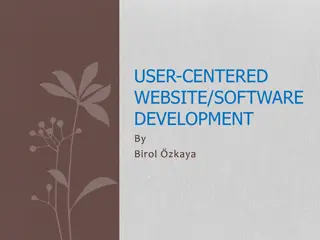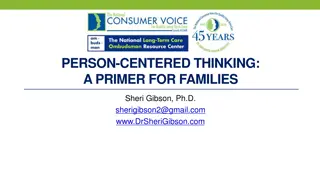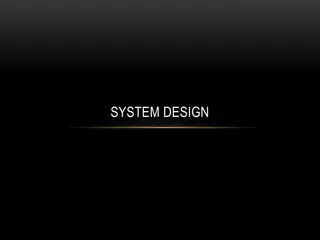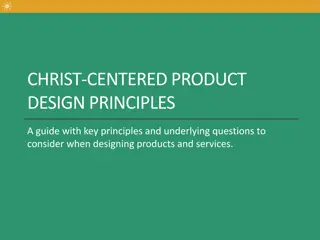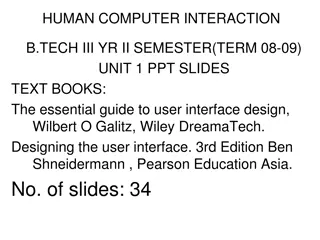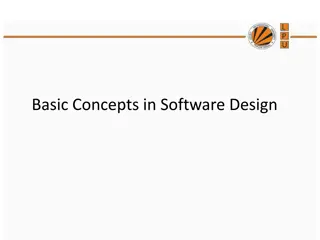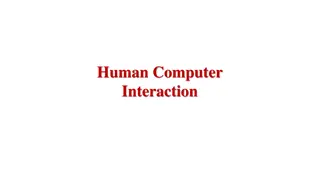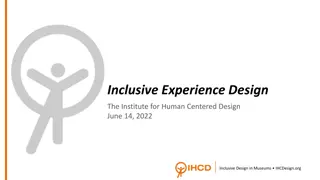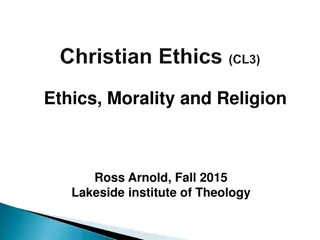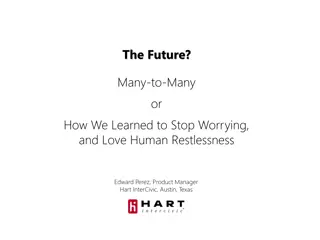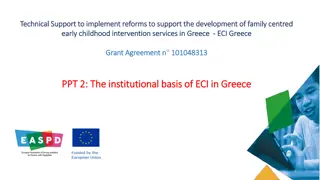Safeguarding Focal Point Training: Person-Centered Approach and Confidentiality
Understanding the principles of a person-centered approach, confidentiality, and consent is crucial in safeguarding training. This training focuses on addressing safety concerns, conducting investigations, and maintaining confidentiality. Ground rules ensure respectful participation and sensitive is
0 views • 24 slides
Meaningful and inclusive curriculum design conversations
In a quest for meaningful and inclusive curriculum design, Karen Fitzgibbon explores a new approach to engage course teams in enhancing curriculum design. By addressing internal and external drivers for change, the aim is to facilitate inclusive conversations that promote learner-centered models and
1 views • 10 slides
Equity-Centered Agile Network Design for Higher Education Inclusion
The East Bay College Agile Network (CAN) aims to create an equity-centered network design between CSUEB, CLPCCD, Chabot College, and Las Positas College to enhance transfer agility and support students in finding their best path towards higher education inclusion and completion. The network focuses
0 views • 31 slides
Guidelines for Designing Person-Centered Care Pathway Schemas
This document provides a template and writing instructions for creating schemas for person-centered and integrated care pathways. It offers insights on visualizing the steps of a care pathway and emphasizes clear communication in the design process. Contact details are included for further guidance.
6 views • 21 slides
Understanding Human Rights in Queensland Government Work
The Human Rights Act of 2019 in Queensland outlines protected rights such as equality, freedom of expression, and fair trial. All public service employees must adhere to these rights, ensuring decisions and actions respect human rights. This act applies to everyone in the Queensland Government, with
2 views • 13 slides
Person-Centered Thinking in Direct Care Services
Providing Person-Centered Care is essential, especially during challenging times like COVID-19. This training focuses on understanding residents' needs, using behavioral and nonverbal indicators to improve care quality, and embracing a strength-based approach. Learn about Person-Centered Thinking, C
0 views • 24 slides
Understanding the Basic Concept of Human Rights in Modern Jurisprudence
Human rights are natural and inalienable, essential for human life, based on universal principles. The concept of human rights is both simple and complex, requiring societal development and political will for implementation. Rooted in natural law theory, human rights have evolved from natural law to
1 views • 24 slides
Understanding Media Ecology: Impact of Communication Technology
Media ecology is a theoretical concept analyzing the influence of media and communication technology on human culture. Neil Postman, a prominent figure in the field, delves into how communication media affect human perception, understanding, and values. This study views media as environments shaping
5 views • 23 slides
Understanding Andragogy Principles for Effective College Teaching
Explore the application of key theories of andragogy, including those of Malcolm Knowles and David Kolb, in college teaching. Discover the importance of experience-driven learning, immediate content relevance, and problem-centered approaches. Learn how to integrate these principles into your teachin
0 views • 27 slides
Software Engineering Design Principles and Concepts
The chapter discusses the essential principles and concepts in software design, highlighting the four key design models - data design, architectural design, interface design, and component-level design. It emphasizes the importance of traceability to the analysis model, minimizing the gap between so
0 views • 36 slides
Understanding Human-Centered Design in ISO 9241-210 by Albrecht Schmidt
Explore the differences between User-Centered Design (UCD) and Human-Centered Design (HCD) as per ISO 9241-210 standards. Delve into the principles and activities of HCD, the rationale for adopting it, and its significance within interactive systems. Learn why HCD emphasizes the holistic perspective
0 views • 17 slides
Enhancing Industrial Heritage Through Customer-Centric Service Design
In the realm of industrial heritage, the design of objects like the one by Sille Roomets brings a unique blend of art and intuition. Connecting service design with marketing is emphasized, focusing on a user-centered approach that aims to make eyes sparkle, both for customers and providers. Understa
0 views • 16 slides
Understanding Person-Centered Planning for Individualized Program Plans
Explore the core values, importance, and practical applications of person-centered planning in developing Individual Program Plans (IPPs) for individuals with developmental disabilities. Learn about the required process, underlying values, different approaches, and the influence of person-centered p
4 views • 11 slides
Understanding Person-Centered Planning for Future Success
Person-centered planning is a creative process that helps individuals, such as young adults, develop plans for how they want to live in the future. It involves aligning visions, goals, and actions while focusing on the person's strengths, relationships, and community involvement. Unlike traditional
0 views • 45 slides
Understanding Person-Centered Care in Healthcare Research
Explore the concepts of person-centered care in healthcare research, focusing on key differences from problem-oriented care, emerging research questions, methodological considerations, and implications for study populations, interventions, and outcomes. Learn about the definition of patient-centered
2 views • 52 slides
Evolution of Human Rights: From Ancient Times to Modern Era
Throughout history, ideas of rights and liberty have evolved, leading to the recognition of universal human rights in the modern sense. The concept of human rights can be traced back to significant historical events such as the English Bill of Rights, the Virginia Declaration of 1776, and the French
0 views • 7 slides
Enhancing Group Communication and Facilitation Techniques
Effective two-way communication is essential for facilitating group activities, negotiating, resolving conflicts, and engaging in online communications. Understanding group behaviors such as task-centered, people-centered, and self-centered can help in effectively managing meetings and group interac
0 views • 18 slides
Person-Centered Counseling: A Historical and Philosophical Overview
Person-Centered Counseling, pioneered by Carl Rogers, is grounded in humanistic principles such as actualizing tendency, awareness, and existential concepts. This approach emphasizes the innate potential for growth and self-actualization within individuals, focusing on creating a supportive and nonj
0 views • 20 slides
Understanding Carl Rogers' Client-Centered Counseling Approach
Explore the historical overview, philosophical underpinnings, and personality development principles of Carl Rogers' client-centered counseling approach. Learn about Rogers' development of theory, his philosophical influences like phenomenology and existentialism, and key concepts such as actualizin
0 views • 23 slides
Understanding Advanced Concepts in Temporal Point Processes for Human-Centered Machine Learning
Explore advanced concepts in temporal point processes through the lens of human-centered machine learning. Topics include marked temporal point processes, independent identically distributed marks, dependent marks, and mutually exciting marks. Learn about stochastic dynamical systems such as the Sus
0 views • 8 slides
Exploring Design Inspiration and Elements in Costume and Fashion Design
Dive into the world of costume and fashion design through a visual journey of finding design inspiration, understanding the design process, emphasizing originality, and exploring different sources of creativity. Discover how technology, art, food, history, architecture, and nature can spark innovati
0 views • 45 slides
The Renaissance Movement: Historical Perspective and Impact on English Literature
The Renaissance, meaning "rebirth," was a period of revival in classical learning, centered in Italy after the Turkish Conquest of Constantinople in 1453. This era saw a shift from medieval beliefs to human-centered thinking, with a focus on exploring the limitless possibilities of the human mind an
0 views • 9 slides
Material Design: Combining Classic Design Principles with Technological Innovation
Material Design is a design language that combines traditional design principles with the possibilities offered by technology and science. It emphasizes visual language, classic design elements, and innovation to create delightful user experiences. The Material Metaphor, Imagery, Typography, Color,
0 views • 34 slides
Principles and Schemes of User-Centered Website Development
User-centered website development focuses on goals of human-computer interaction, content organization, and visual organization. Explore safety, utility, effectiveness, efficiency, usability, and appeal. Learn about different organizational schemes like alphabetical, chronological, geographical, top
0 views • 20 slides
Understanding Person-Centered Thinking for Families
Person-Centered Thinking is essential for supporting loved ones in long-term care settings. This primer explores the impact of Person-Centered Thinking on individuals, how to recognize its effectiveness, and ways to promote a culture change in care communities. By prioritizing respect, dignity, info
0 views • 20 slides
The Link Between Democracy and Human Rights
The core of democracy lies in promoting equal human worth and self-determination. There is a strong connection between human rights, democracy, good governance, and development. Democracy allows people to participate in decision-making, ensuring their views are heard. It upholds freedom, equality, f
0 views • 15 slides
Comprehensive Guide to System Design Components and Techniques
System design involves the detailed planning and identification of components in an information system, aiming to provide users with a general understanding of the new system. This process includes techniques like flowcharts, prototyping, and component design, covering aspects such as output design,
0 views • 24 slides
Christ-Centered Product Design Principles Guide
This guide focuses on designing products and services with Christ-centered principles in mind, aiming to impact clients holistically, including spiritually. It emphasizes the importance of intentional design to reflect Christ and His Kingdom. Key questions and strategies are provided to create produ
0 views • 7 slides
Importance of Human-Computer Interaction (HCI) in User Interface Design
Human-Computer Interaction (HCI) is a crucial discipline focusing on creating interactive computing systems that are user-friendly and efficient. This involves designing, evaluating, and implementing systems that cater to users' needs, ultimately improving user satisfaction and productivity. The fie
0 views • 39 slides
Understanding Basic Concepts in Software Design
Software design involves transforming customer requirements into a form suitable for implementation, with activities categorized into preliminary and detailed design stages. High-level design focuses on module identification and control relationships, while detailed design entails defining data stru
1 views • 24 slides
Exploring Genesis: A Gospel-Centered Overview of Creation, Fall, and Redemption
Delve into Genesis through a Gospel-centered lens, uncovering the purpose of mankind, the ideal roles of man and woman, the nature of sin, the fall and its consequences, and the promise of redemption. Discover the interplay between God's design, humanity's shortcomings, and the hope for restoration
0 views • 11 slides
Understanding Interaction Design in Human-Computer Interaction
Interaction design focuses on creating interactive products that are easy, effective, and enjoyable to use. It aims to reduce negative user experiences while enhancing positive ones. Designing interactive products requires understanding user activities, interfaces, and device arrangements to support
0 views • 11 slides
Enhancing Transparency in Human Rights Performance Measurement
This information focuses on initiatives like the Human Rights Measurement Initiative (HRMI) that aim to provide new data for researching and advocating human rights issues globally. The HRMI project, founded in 2015, collaborates with various stakeholders and is funded by philanthropic grants. It em
0 views • 19 slides
Family Centered Services of CT: Empowering Youth through TOP Sessions & Community Service
Family Centered Services of CT, led by Executive Director Cheryl Burack, offers a nationally-replicated youth development program focusing on teen pregnancy prevention and academic success. Through TOP Sessions, 15-17-year-olds engage in guided discussions, community service learning, and individual
0 views • 8 slides
Enhancing Care Coordination for Improved Patient Referral Experiences
Explore the importance of patient-centered referral experiences, highlighting the impact of effective care coordination on patient outcomes. Contrasting cases illustrate the difference between non-patient-centered and patient-centered referral processes. Learn actionable steps to ensure all stakehol
0 views • 52 slides
Inclusive Experience Design: Enhancing Cultural Accessibility
The Institute for Human Centered Design is a 44-year-old non-profit organization dedicated to enhancing experiences for people of all ages, abilities, and cultures through excellence in design. Their core beliefs emphasize the impact of design on daily lives and the importance of designing for inclu
0 views • 19 slides
ICPAC Guide to Co-produced Climate Services
ICPAC has extensive experience in bridging science and application in climate services, leading to the creation of the ICPAC Guide to Co-produced Climate Services. This guide illustrates practical ways of applying co-production approaches in the Eastern Africa region, emphasizing multi-stakeholder e
0 views • 5 slides
Exploring Ethics, Morality, and Religion: A Philosophical Journey
Delve into the intricate realm of ethics, morality, and religion as they intersect in human decision-making. Uncover the fundamental questions of right and wrong, good and evil, and the role of religious beliefs in ethical considerations. Explore ancient and modern perspectives on ethics, from agent
0 views • 9 slides
Embracing Human Restlessness in the Era of Many-to-Many Connectivity
Exploring the shift towards human-centered design and the rise of many-to-many solutions in technology, this presentation by Edward Perez delves into the concept of the Internet of Things and its potential impact on connectivity. It discusses the importance of adapting to human needs, enhancing usab
0 views • 19 slides
Supporting Family-Centered Early Childhood Intervention Services in Greece
The grant agreement aims to implement reforms supporting the development of family-centered early childhood intervention services in Greece. It emphasizes the human rights and child rights framework, highlighting the legal and political basis of early childhood intervention in the country. The conte
0 views • 7 slides

